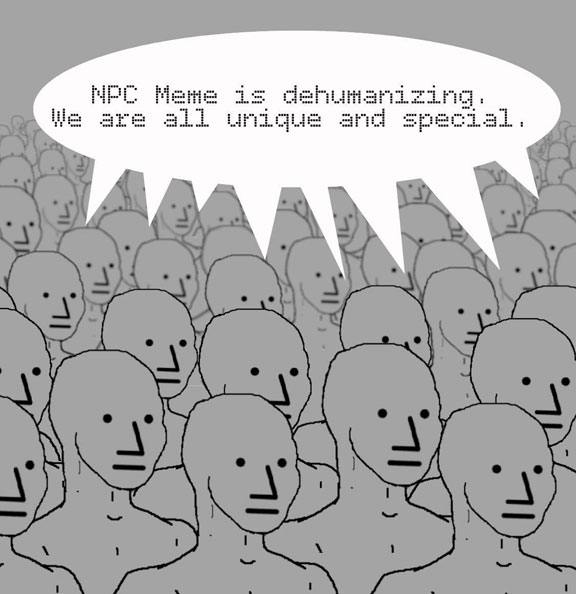A Borg By Any Other Name
This is a strange time to be a human being.
Do you remember the Borg? You will if you were a Sci-Fi fan – the Borg were “cybernetic organisms,” linked in a “hive mind” called “The Collective.”  They were a sort of villain group on the Star Trek series, who co-opted the technology and knowledge of other species into The Collective through something called assimilation, injecting nanoprobes into the bodies of their victims and surgically augmenting them with cybernetic components. Their goal: perfection.
They were a sort of villain group on the Star Trek series, who co-opted the technology and knowledge of other species into The Collective through something called assimilation, injecting nanoprobes into the bodies of their victims and surgically augmenting them with cybernetic components. Their goal: perfection.
Fanciful, of course, but in a more real-world way, The Borg are us. The “nanoprobes” are our devices (cell phones, computers, Apple watches); the Collective is actually a few warring Collectives from through which we enter our Hive Mind ideas; and the “perfection” we seek is what we believe is the ideal way to live, think, and be.
Of course it’s an imperfect metaphor, but perhaps a reasonable warning that relying too much on devices as our eyes and ears —and transmitters of what we should think and how we should feel— is not the inherent way human beings interact.
It seems every time you wake up in the morning a new story has spawned and spread from device to device – often it seems without a whole lot of human intervention (in fact, in the case of many social platforms, we are told that AI is determining what does and does not meet that social platform’s “standards”). Take “NPC,” for example.
NPC is a reference to computer gaming. An “NPC” is an “extra” in the game world – a “nonplayable character.” This character is programmed into the game to perform a
certain function at certain intervals. Unlike the characters guided by players, this NPC simply does what it’s supposed to at random or pre-programmed times. A few weeks ago, an NPC was something known to gamers and otherwise quite meaningless to our larger community. Now, it’s an insult that is driving the two “sides” we seem to be devolving down into: the Alt-Right versus the SJW Left. The “NPC Meme” is being hurled at protesters who chant phrases over and over at demonstrations, or who affect a call-and-response “What do we want?” (Something) “When do we want it?” (Now) demand. Calling this “NPC” behavior reduces it to Hive Mind behavior.
Now, don’t mistake me – the political divide has always been with us, and isn’t in and of itself a bad thing. Opposing forces help keep us in a form of balance, as uncomfortable as the process itself may feel.
What’s new, and what we have yet to discover the impact of, is the automation factor – and the sheer power of the device itself to alter our absorption and reaction to information.
Among other things, there is the repetition. Rote learning is useful: vocabulary words, spelling, mathematical formulas, dates and events. Rote learning provides a set of data that can be drawn upon for more complex analysis and understanding. But absent that more complex and abstract thinking, rote learning can also be dangerous. It doesn’t ask “why?” It doesn’t explore contributing factors. It doesn’t even really ask: “is this always true?”
But devices are particularly adept at repeating information, or more
particularly, at reducing a complex idea to a “meme,” that smallest possible unit of information that can be passed from person to person, or cell to cell in the Hive Mind. I’ve been struck recently by the speed with which verbal tics replace original and genuine communication. “Problematic,” “optics,” “toxic” and a host of other words are now peppered into just about every news story or panel discussion on television, as well as used in “click-bait” headlines on newsfeeds. A year ago, none of them appeared in day to day communication with any regularity. The sheer speed with which these words have been adopted and the frequency with which they’re used demonstrates the power of repetition to lock an idea into our minds, whether we really consider what it means or not.
Then, as we’ve discussed before, there is the issue of that “programmed” censorship in the name of “standards” of the particular platform. Or serving up information to a user that deliberately either enhances or contradicts their demonstrated preferences. If the material we’re offered is in short hits (many platforms will tell you approximately how many minutes a particular article will take to read, for example) and fed to us with a weighted spoon, we eventually become adapted to what we’re being told, especially if it “goes down” easily.
And there is the phenomenon of recording and sharing almost every aspect of our lives with an apparent “audience.” The most appalling example of this was a young girl, busy talking into her phone (video enabled) who rolled her car, killing a passenger, and never stopped talking to her phone. Another Borg-like notion that we are all paying attention to one another non-stop, at a distance, always connected and all part of The Collective.
A long time ago, by Internet standards, a photo would be shared on Facebook with the challenge: how quickly can this image go around the world? Now it would be: can you put a photo up on Facebook and then not check in for an hour to see if anyone “liked it?” How about a day? A week? Can you leave The Collective?









